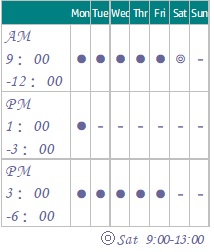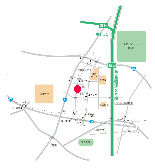TOSAKI Clinic
for Diabetes and Endocrinology
Practice Subjects:
Internal medicine, diabetes, endocrinology
Consultation Hours:

Telephone:
052-800-2333
Facsimile:
052-800-2332
Address:
2-1007, Motoueda, Tenpaku ward, Nagoya city, 468-0009, Japan


What is diabetes?
Diabetes is a disease with high blood sugar (glucose) level. High blood sugar level does
not cause problems immediately, however, you will have high possibility of
having complications if it prolongs for years. The goal of diabetes treatment is to
lower blood sugar level in order to prevent those complications.
Common complications of diabetes (and their symptoms):
-Diabetic neuropathy-numbness/pains in legs, dizziness etc.
-Diabetic retinopathy-decreased/loss of vision etc.
-Diabetic nephropathy-protein urea, swelling, dialysis etc.
-Heart attacks-acute heart pain, cardiac arrest etc.
-Strokes-paralysis of arms and legs, speaking problems etc.
-Gangrenous legs-swelling/red feet, decayed feet etc.
-Gum disease-pain in gum, loss of teeth etc.
Those complications do not occur immediately after diagnosed with diabetes.
Then what kind of symptoms will you have in the earlier stage of diabetes?

Diabetes symptoms
There are almost no symptoms which you can feel when you are in the early
stage of diabetes.
-You have been told that your blood sugar level is high at a medical check
-You have been told that there is sugar in your urine when taking urine test for
cold
-You have been told that your HbA1c is high
These are common situations for patients without any symptoms to be
diagnosed with diabetes.
Even if your blood sugar level is 200 mg/dL once, you don’t feel any pains or
unpleasantness. This is the fear diabetes holds.
Since there are no tangible symptoms, many patients may think “I don’t have
any problem with my body and I don’t need treatment,” “They must have made
some mistakes with the medical check results,” “I think my condition will not
worsen soon,” “I don’t understand why I should be treated when I have no
symptoms.” I have encountered many of them who have decided not to visit
clinics and their diabetes and complications deteriorated few years later.
Even if you don’t have symptoms, your diabetes and vascular disease does
progress while you don’t know it.
Please reach for the right treatment at as early in your diabetes as possible.
If your HbA1c is higher than 5.0%, I recommend starting good diet and
receiving medical check more than once every 6 months.
If your diabetes progresses, you will start to have symptoms below (this is the
stage where your diabetes has progressed a lot.)
-Thirst-your blood sugar level is high and your brain is sending signals trying to
lower it with water
-Drink a lot of water-many people drink soft drinks rather than water and the
blood sugar level becomes higher, often ending up with unconsciousness (PET
bottle syndrome). If you are thirsty, you should drink water, tea, or calorie-free beverages.
-Go to restrooms frequently-you drink more water and you go to restrooms
more.
When your condition worsens even more and your blood sugar level is higher
than 200 mg/dL before meal and 300 mg/dL after meal, you will:
-Lose weight-your insulin is not working correctly and your body cannot take
in nutrition even when you eat properly. At worst you will lose 5-10 kg within a
month.
If your condition deteriorates even more…;
-Vomiting, exhaustion, diabetes ketoacidosis-your blood becomes acidified
and ketone bodies are seen in your blood and urine, a very dangerous state.
You will need an immediate treatment (mass amount of salt-water instillation or
temporary insulin injection) or else you will die at the worst case.
In order to prevent those symptoms and complications, how much should you
lower your blood sugar level?

Blood sugar (glucose) level and HbA1c
Normal range of blood sugar (glucose) level before breakfast is 70-109 mg/dL. Non-
diabetic people’s blood sugar level does not exceed 140 mg/dL even 2 hours
after meals.
In order to figure out how much your blood sugar level is, we measure your
blood sugar level at your visit. However, it is difficult to tell your condition with
your current blood sugar level.
In order to make sure, we measure your HbA1c along with your blood sugar
level. (At our clinic, we have a machine which tells us both results within a
minute.)
HbA1c is measurement which reflects your blood sugar level for the past 1-2
months. Even if your sugar intake is lower for few days before the test, it will
not be affected. If your HbA1c is higher than 8% for a long time, you will have
higher risk of developing complications. If you maintain HbA1c lower than 6.5%,
your risk of having complications is very low.
So what kinds of treatments are there to maintain low blood sugar level?

Diabetes treatment
Diet
This is the most important treatment, more important than medicines or
exercise.
The most important point for diet is to minimize total calories. The second is to
understand what carbohydrates, protein, and fat do to your blood sugar level.
Exercise
If you can burn calories which you gained with your meals by exercising, you
can lower your blood sugar level.
Medicines
If your blood sugar level does not decrease enough with diet and exercise,
we will use oral medicines or injections to lower your blood sugar level.
Recent study shows that there are certain types of medicines which prevent
development into diabetes if you take them at the stage of borderline diabetes.
